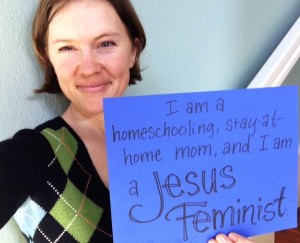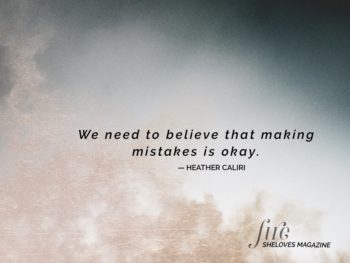
Calling myself a feminist keeps me honest.
****
One of the biggest culture shocks I ever experienced (yes, it rivaled South America) was going to the Bible Belt for college at a small, secular university.
When I visited the school before enrolling, I discovered that the broader campus culture was almost a reaction against the strictures of down-South conservatism. The girls that hosted me spoke with derision about the Bible studies on their hall. There were parties called “Night of Decadence” and “Bacchanalia” that were famed for their wildness.
I went to a meet-and-greet for on-campus clubs, and found a sophomore standing at a booth for one of the campus ministries. “Are there Christians here?” I asked, with an edge of desperation in my voice. I really liked the school, except for feeling intimidated by how secular it was.
She laughed, knowingly. “There are lots of Christians! Just sign up for one of the campus ministries, and you’ll be fine.”
So as soon as school started, I jumped into the same college fellowship my roommate wanted to attend. Okay, I thought to myself. Now I won’t be alone.
A few weeks later, I helped plan the “freshman night” for the fellowship. There were ten of us at the meeting. Only one guy showed up. He was a quiet type, and when we asked who wanted to MC the next Friday, he didn’t raise his hand.
So we picked two girls.
Days later, one of the seniors, Matt, called a meeting with us. Looking sheepish, he explained that there was a change in plan because in the fellowship, women weren’t allowed to lead men. He apologized for the misunderstanding, and said the campus director had asked two freshman guys to step in.*
I was surprised by a few things.
I was surprised who got angry. Two of the girls I’d thought of as flimsy wallflowers squared their shoulders and quit the fellowship on the spot.
I was surprised at who didn’t get angry.
Me.
***
Here’s the thing: my normal was women in leadership.
At my church back home, there had always been a woman serving in one of the pastoral positions. A few years after I started college, our church even called a woman to serve as head pastor.
There were women serving communion each Sunday and leading as elders and serving as deacons alongside the women who arranged the flowers on either side of the cross in the chancel.
But less than a month after leaving home for school in Houston, I was ready to assume there was something wrong about my home church. I was ready to believe that it might be unchristian to raise my voice, to lead in our fellowship, and to say no.
And it wasn’t just that one time. No: for four years, I went along willingly. I started attending a church that didn’t allow women to serve communion, much less preach. I sat quietly in the pews, a little astonished at the tall white men in suits going back and forth with trays. I didn’t leave when someone told me the women were welcome in children’s ministry until the boys turned thirteen.
I worked in the campus bookstore for a few years, and I remember passing the women’s studies shelves and practically averting my eyes. I hadn’t really considered myself a feminist before college—it hadn’t seemed a burning issue. But now I thought perhaps feminism was wrong. Maybe I needed to have enough faith to submit to the new culture around me. Better not to meddle in things that might get me ostracized.
I didn’t get angry. I didn’t say my questions out loud. I didn’t leave.
I see now that my passivity wounded my heart. I was willing to deny myself and lose my soul. I was willing to play along.
***
It took me a few years to figure out that keeping quiet that first planning meeting was the beginning of all that went wrong for me in college. It took me a while to realize that the wounds wouldn’t close up on their own. It wasn’t enough simply to go home, back to a church that affirmed women.
No: I had to learn to advocate.
When I say the words, “I am a feminist” out loud, it is as much for me as for anyone else. I am reminding myself that Jesus does not call me to please people. I am reminding myself I am called to stand against the powers of darkness. I am commissioning myself to own my gifts, my calling and my personhood. I am reminding myself that I want to make these words normal to my daughters. I am reminding myself to make my heart and my words match. I am reminding myself to stand with other women.
I am a Jesus feminist because in this world, it is not enough to silently affirm that women are people too. No, in this broken world, I need to stand up and be counted.
I’d invite you to read Sarah’s book and catch a vision of what a whole, healed Kingdom of God would look like.
*By my senior year, the policy to not have women MC had changed, without much fanfare, but women’s place in the ministry was never truly affirmed.















 When the Bible Disturbs You
When the Bible Disturbs You
Yes! That paragraph there: “When I say the words, “I am a feminist” out loud, it is as much for me as for anyone else. I am reminding myself that Jesus does not call me to please people. I am reminding myself I am called to stand against the powers of darkness. I am commissioning myself to own my gifts, my calling and my personhood. I am reminding myself that I want to make these words normal to my daughters. I am reminding myself to make my heart and my words match. I am reminding myself to stand with other women.”
That one is exactly what I feel in my heart, too. The word keeps me honest, too, and I love how you put this. Spot on, Heather. Thank you!
Thanks, Sarah! Thanks for your affirmation, and the bravery of putting this book out there.
I am VERY excited about reading this book! I’m just waiting for the Amazon fairy to deliver it to my door 🙂
Oooh, I love the Amazon fairy. Enjoy the book Esther!
Can we please please get this book in kindle form… I don’t buy paper unless I absolutely have to!
Here’s a link to the kindle version, Rob! I hope you enjoy it!
http://www.amazon.com/Jesus-Feminist-Invitation-Revisit-Bibles-ebook/dp/B00BSBR558/ref=sr_1_1_bnp_1_kin?ie=UTF8&qid=1386627500&sr=8-1&keywords=jesus+feminist
It makes me so sad when I think of all the female voices that have been silenced. As if God didn’t know what He was doing when He created us. Love all the stories women are sharing as they read this book, though. Thanks for posting.
Amen, Sandy. That point in Sarah’s book (and in Carolyn Custis James’ book, Half the Church) is what is really making me want to speak out right now. The church has been limping along without our voices for far too long. It isn’t healthy, it isn’t fair, and it isn’t what God intended. May he equip us and empower us to raise our voices–whether or not we are invited to.
Heather, this piece is just wonderful. I loved learning a little bit more of your background. My normal was definitely not women in leadership as a young girl, so I found it interesting that that’s where you started, and then kind of swung the other direction for a while. Thank you for your courage in sharing your story. Much love friend.
Thanks, Megan. Yeah, it’s still odd to me, looking back, at how easily I left the tradition I was raised in. I think that’s why I think these beliefs and values need to be made explicit. Otherwise, it’s too easy to hedge, to give into pressure, to question. Not unlike being a Christian or any belief system, I think: unless you’re willing to own that identity, there’s not much to stand on if push comes to shove.
Thank you Heather. This is an issue that has popped up so often in my life. Being unmarried adds an extra challenge (otherwise you can claim your husbands authority). But I have decided that God gave me gifts to use. I will not bury my talents, nor let anyone else do that for me.
So I say with you: I am a Jesus feminist
Thanks, Ilja–yes, I can imagine how much more fraught your identity as a woman can be if you’re unmarried–not falling into acceptable boxes as a woman goes so against the grain. May God empower you and fortify you to live out your calling and bless all of us with it!